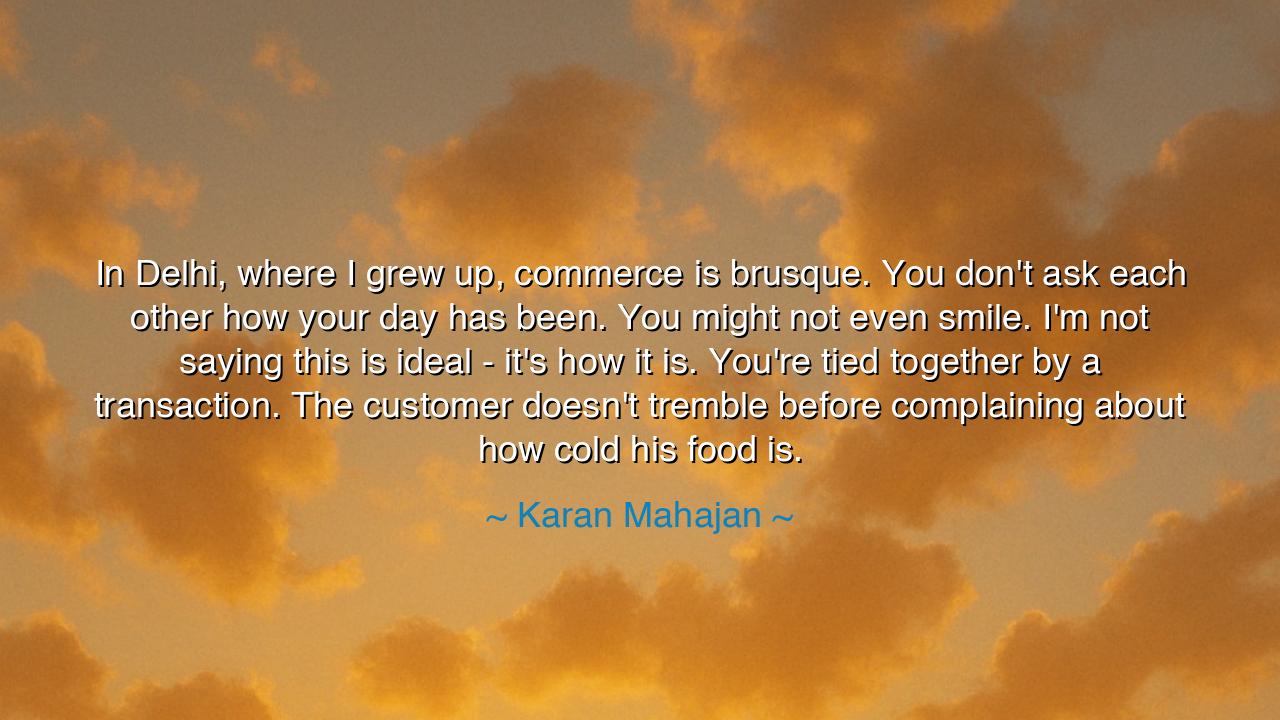
In Delhi, where I grew up, commerce is brusque. You don't ask
In Delhi, where I grew up, commerce is brusque. You don't ask each other how your day has been. You might not even smile. I'm not saying this is ideal - it's how it is. You're tied together by a transaction. The customer doesn't tremble before complaining about how cold his food is.






The words of Karan Mahajan are spoken with the blunt clarity of one recalling the soil from which he came: “In Delhi, where I grew up, commerce is brusque. You don't ask each other how your day has been. You might not even smile. I'm not saying this is ideal—it’s how it is. You're tied together by a transaction. The customer doesn't tremble before complaining about how cold his food is.” At first glance, it may seem a portrait of a marketplace. Yet deeper still, it is a meditation on the nature of human exchange, on how culture shapes the way we give and demand, on how honesty sometimes takes the place of courtesy.
The meaning here lies in the word brusque. In Delhi’s rhythm, commerce is stripped of pretense. The mask of politeness is cast aside, and all that remains is the raw bond of transaction. There is no false smile to soften the deal, no delicate ritual to cloak the exchange. Instead, there is directness, sometimes harsh, but never hidden. Mahajan does not glorify it, nor condemn it—he simply reveals it as the ground of his upbringing, a truth both unvarnished and instructive.
The ancients too recognized the varied faces of commerce. In the bazaars of Babylon, merchants haggled fiercely, voices rising like thunder, yet no insult was taken—for the deal was the bond, not the words around it. In contrast, the traders of ancient Japan wrapped transactions in layers of bowing, of honorifics, of ritual courtesy. Neither way was “ideal,” but each reflected the soul of its people. Mahajan’s Delhi is closer to Babylon than Kyoto—fierce, direct, unadorned.
There is also a lesson here about honesty and power. In a brusque culture, the customer does not tremble. He speaks his dissatisfaction plainly: “The food is cold.” This courage of expression, though rough, carries dignity. It refuses to bow before false hierarchies, reminding us that in commerce, as in life, both sides have voice and value. While politeness may oil the wheels, it can also conceal truth. Brusqueness, for all its sharpness, ensures that grievances are heard.
The origin of such an attitude may lie in the very intensity of Delhi itself—a city vast, crowded, and unrelenting, where survival demands efficiency. In such a place, time is precious and words are currency. Courtesy may be sacrificed, but clarity thrives. To grow up in such a climate is to learn that relationships are often built not on sentiment, but on necessity. Yet even in this, there is a kind of truth: bonds forged through transaction may be fleeting, but they are real.
And yet, Mahajan acknowledges what is lost: the smile, the question about one’s day, the warmth that transforms transaction into connection. This tension is the heart of his reflection. He neither condemns brusqueness outright nor blesses it as virtue. Instead, he reminds us that culture gives us habits, and habits give us blind spots. A people who master directness may lose tenderness; a people who master politeness may lose honesty. The wise soul learns to hold both.
The lesson, then, is this: know the spirit of your culture, but do not be enslaved by it. If you are shaped in brusqueness, learn also gentleness. If you are shaped in courtesy, learn also courage. In practice, this means speaking truth when it must be spoken, but offering warmth when it can be given. Ask about a person’s day, even if it is not custom. Smile, even if the marketplace does not require it. Let transaction remain real, but let it also be human.
So let Mahajan’s words endure as teaching: commerce is never only about goods exchanged—it is about souls brushing against one another in the daily theater of life. Whether in Delhi’s brusque bazaar or in the quiet shop of another land, remember that each exchange can either remain a bare transaction or become a seed of connection. Choose, when you can, to add the smile. For in that small act, you restore to commerce its highest calling: not merely to trade, but to bind human beings together.






AAdministratorAdministrator
Welcome, honored guests. Please leave a comment, we will respond soon